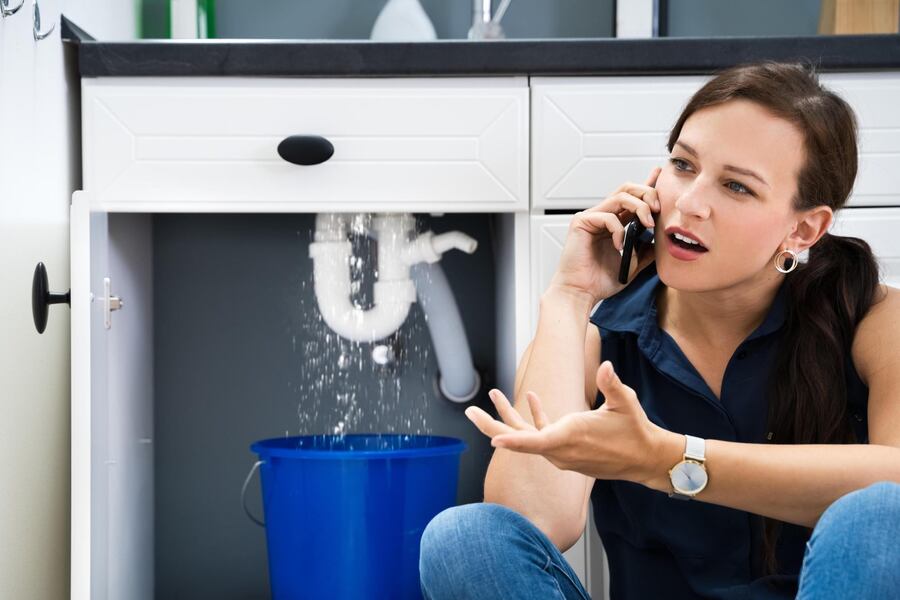Call This Thursday to Get $50 OFF
Call us Now to Get $50 OFF.
Ratings based on 6379 reviews
Local Plumbers, Local Reviews
Call This Thursday to Get $50 OFF
Call us Now to Get $50 OFF.
Ratings based on 6379 reviews
Local Plumbers, Local Reviews

A plumbing leak rarely shows up when it’s convenient. Most people discover them after water damage, mold, or rising utility bills have already done their work. Whether you’re dealing with an older house or trying to avoid repeat calls to a plumber, it’s important to know the early signs and root causes of leaks. Mr. Rooter Plumbing can help. We see every kind of leak you can imagine, and most of them could’ve been avoided with a few simple changes. Read more if you want to avoid frequent plumbing repair service calls and learn how leak detection in Phelan can help protect your home from damage.
The materials used in your home’s plumbing play a big role in how vulnerable your system is to leaks. If your house was built before the 1990s, it might still have galvanized steel pipes. These are known for corroding from the inside out and causing leaks or full pipe failure. Copper piping lasts longer, usually 50 to 70 years, but it’s not immune to corrosion either, especially in areas with acidic water. Newer homes use PEX or PVC, which tend to resist corrosion better, but they have their own risks. PEX can be damaged by UV exposure or extreme temperatures if not installed properly. PVC is more brittle and can crack under pressure or during extreme cold. Knowing what kind of pipes you have allows you to anticipate when problems might arise. If you're unsure, a quick visit from a plumber can identify the pipe material and give you a sense of its remaining lifespan. They may not need to be replaced immediately, but if your home is nearing that window, it’s wise to monitor joints and elbows for early signs of stress or corrosion. Leak detection tools like moisture sensors placed near vulnerable spots can offer peace of mind if your pipes are aging.
Older homes weren’t designed to handle today’s water pressure. If your faucets seem unusually strong or you hear banging noises when turning off taps, your system may be dealing with excessive pressure. Most residential plumbing systems are designed for pressures between 40 and 60 psi. Anything above 80 psi increases the risk of leaks, joint failure, and appliance damage. High water pressure can also weaken seals inside dishwashers, washing machines, and toilets, so you’re also at risk of small, persistent drips that drive up water bills and contribute to long-term damage behind walls or under floors. You can check your water pressure with a simple gauge from any hardware store. If the reading is high, a plumber in Hesperia, CA can install a pressure-reducing valve to stabilize the system. Routine maintenance also helps. If you’ve recently moved into an older home, don’t assume the plumbing is up to modern standards. Have a professional perform a system check before something breaks.
Many leaks begin as the result of everyday habits. Pouring grease down the sink, using chemical drain cleaners, and over-tightening faucet handles are just a few examples. These practices wear out your pipes slowly until one day, you’re dealing with a full-blown leak behind the wall. Grease builds up inside pipes, even when chased with hot water. As time moves on, it hardens and causes blockages, which leads to pressure build-up and small cracks or leaks in the line. Chemical drain cleaners do something similar. While they may clear clogs temporarily, the harsh ingredients erode pipe interiors, especially if used repeatedly. The erosion thins the pipe walls and makes them more vulnerable to leaks. Another common mistake is ignoring small signs. A dripping faucet, a running toilet, or a slow drain doesn’t feel urgent, but they’re usually signs of underlying stress in the system. Instead of waiting until the damage is visible, schedule a plumbing repair service when issues first appear.
Tree roots are persistent, and the tiniest cracks in an underground pipe are enough to attract them. Once roots find a water source, they grow into the pipe and expand, then slowly break it apart. The result is most often a sudden, unexpected leak that may not be visible from inside the house. One of the biggest risks comes from large trees planted too close to sewer lines or water mains. Slow drains and gurgling toilets may be early signs of root intrusion. Leak detection in these cases involves camera inspections, which let a plumber assess the situation without digging. If caught early, hydro-jetting can clear out the roots before they cause serious pipe damage. For long-term prevention, consider root barriers or choose landscaping plants that won’t invade underground lines. Homeowners sometimes assume root damage is inevitable, especially in older neighborhoods, but with routine checks and responsible planting, most of these leaks can be prevented. If you’re doing yard work or planting trees, always mark underground lines first.
Most leaks come from neglect, not age. Calling a plumber before things get serious is the smart move. Mr. Rooter Plumbing provides effective plumbing repair services and accurate leak detection to protect your property. If you’ve noticed small signs of stress in your plumbing, schedule an inspection with us today.
Everyone knows the hopeless frustration of turning on a faucet for a chore and not receiving the steady…
Read MoreMost of us don’t even remember the existence of a septic system when they're operating properly. However, it…
Read MoreWater is the ultimate compound that is essential to our very being. We cannot survive without it and…
Read MoreTo many homeowners, DIY ideas will seem like good options most of the time, especially if you are…
Read MoreThere are some fixtures that are essential in every household, and toilets are one of these. So, when…
Read More